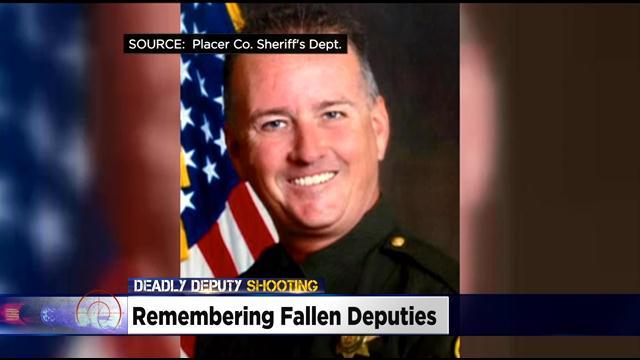Suspect In Deaths Of California Deputies Had Many Names Between Deportations
SAN DIEGO (AP) - The man accused in a shooting rampage that left two sheriff's deputies dead and a motorist seriously wounded was living in the United States illegally. He had been convicted in Arizona for selling drugs and deported to Mexico twice.
Luis Enrique Monroy-Bracamonte's background almost certainly should have flagged him for expulsion again. But he appeared to be living quietly with his wife in a suburb of Salt Lake City until his arrest Friday after the shootings in Northern California.
Investigators were trying to determine how he avoided scrutiny.
The man arrested on Friday said he was 34-year-old Marcelo Marquez of Salt Lake City when he was taken into custody, but his fingerprints matched biometric records of Monroy-Bracamonte in a federal database, U.S. Immigration and Customs Enforcement spokeswoman Virginia Kice said. He was first removed from the country in 1997 after a conviction for possession of drugs for sale in Arizona, then arrested and repatriated to Mexico again in 2001.
Police said Monday afternoon that he had also been arrested in Utah nearly 10 years ago, but authorities didn't connect him with his criminal past or his previous deportations.
West Valley City police say they took a fingerprint from a man using the name Marcelo Marquez during a misdemeanor hit and run arrest in 2003.
However, Utah authorities say fingerprints from such suspects are not regularly entered into a database that would flag other arrests in the U.S. or deportations.
Sacramento County Sheriff Scott Jones told The Sacramento Bee on Sunday that he may have lived under multiple identities and that he may have had troubles with the law under another name.
"We're not convinced we have a full picture of his identity," Jones told the newspaper. "Immigration has come up with one identity. We are not entirely convinced that is his only identity."
Mauro Marquez, his father-in-law, told the Los Angeles Times that he always knew him as Luis Monroy and said his son-in-law worked as a house painter. He said the couple married about 14 years ago in Arizona and moved to Utah a couple of years later.
Marquez told the newspaper that and he and his wife spent time with them each year around Christmas at their home in West Valley City, a suburb of Salt Lake City.
His daughter, Janelle Marquez Monroy, 38, was arrested on suspicion of attempted murder and carjacking on Friday. Police said she was with her husband during most of the crime spree, which began when Sacramento County sheriff's Deputy Danny Oliver, 47, was shot in the forehead as he checked out a suspicious car in a motel parking lot.
The couple are accused of leading authorities on a six-hour chase that included two carjackings before their capture. One motorist who resisted surrendering his car keys was shot in the face. Two deputies who approached the couple on a road were shot with an AR-15-type assault weapon, police said. Homicide Detective Michael David Davis Jr., 42, died at a hospital.
No attorneys were listed for either suspect in jail records.
A search of Utah court records for Marcelo Marquez shows about 10 tickets and misdemeanor traffic offenses between 2003 and 2009, which typically don't trigger a fingerprint check against immigration records. The records list one speeding ticket in 2009 and three small claims filings attempting to collect outstanding debts.
Monroy-Bracamonte appears to have avoided work for government contractors or other employers that might have exposed him to extra scrutiny.
Krista Sorenson of Salt Lake City said Monroy-Bracamonte and his brother mowed her lawn and fixed her sprinklers about four years ago, describing them as "just super nice, decent, hard-working, trying to figure out how to make a living." They distributed handbills that said Brothers Landscaping.
Peter Nunez, a former U.S. attorney in San Diego and chairman of the Center for Immigration Studies, which advocates for tighter immigration policies, said the incident exposes shortcomings in border security and interior enforcement. He questioned how the suspect was apparently able to assume another identify.
"It's symptomatic of the entire system," he said.
Dan Kowalski, an Austin, Texas, immigration attorney and editor of Bender's Immigration Bulletin, said such violent outbursts are difficult to predict.
"Short of locking down the border and deporting everyone and not letting anyone in in the future, even as a tourist to go to Disneyland, that's the only solution, and that's not really a solution," he said.
___
Associated Press writer Scott Smith in Fresno, California, and Lindsay Whitehurst in Salt Lake City contributed to this report.
Copyright 2014 The Associated Press.




